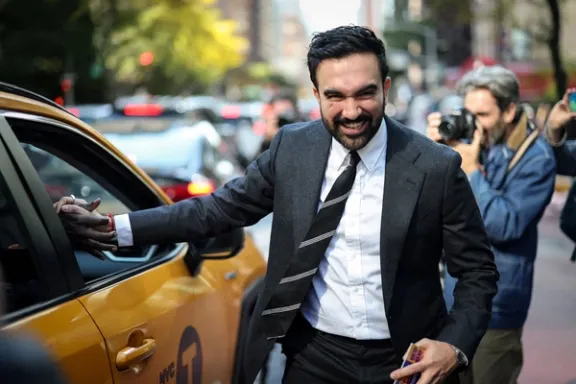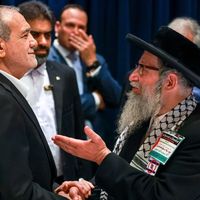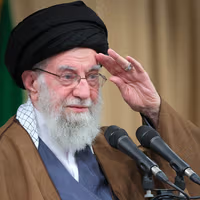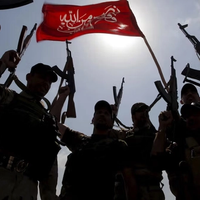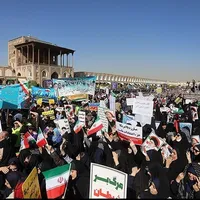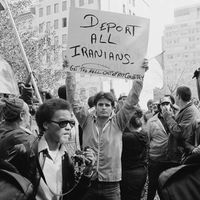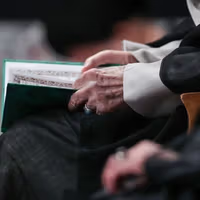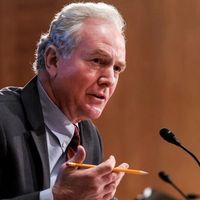Mamdani, a 34-year-old state assemblyman, won the Democratic primary in June, edging out former New York governor Andrew Cuomo.
Born in Uganda to parents of Indian descent, he was raised in New York and has championed affordability in a campaign which has belatedly earned the praise of some Democratic leaders. If elected he would be New York's first Muslim mayor.
His platform emphasizes affordable housing, police reform and Palestinian rights, earning him strong backing from progressives and Muslim organizations.
But his left-leaning and pro-Palestine positions have unsettled some Iranian exiles who see echoes of populist and millenarian promises they say marred their homeland in the 1979 Islamic Revolution.
"Modern Iranian history flashes a bright caution sign as America’s far left and Islamist movements converge in our cities and universities," Andrew Ghalili, senior analyst at advocacy group the National Union for Democracy in Iran, wrote in The New York Sun.
"Iranians have seen this movie before, and the American left are playing their role perfectly. It’s only a matter of time until the tragic third act," he added.
Mamdani was criticized for using the phrase "globalize the intifada" during the mayoral primary, a phrase referring to a Palestinian uprising years after campus protests against Israel's incursion into Gaza beginning at Columbia University in New York spread nationwide and inflamed debates about free speech and anti-Semitism.
He has since distanced himself from the slogan and has campaigned with representatives of many faiths, including Jewish and Muslim leaders.
Many first and second-generation immigrants from Iran are conservative and skeptical of the role of Islam in public life, holding up the nearly 50-year-old Islamic theocracy in their homeland as a cautionary tale.
Mamdani has hit out at what he has called Islamophobia in the wake of the 9/11 attacks but has not cited Islam as a basis of his political outlook.
University of Illinois at Chicago PhD candidate and commentator Sana Ebrahimi criticized Mamdani’s promises of free services on X, comparing them to Ayatollah Khomeini’s unfulfilled pledges.
“Every time I see those curated photos of Zohran Mamdani, I am reminded of Khomeini as a ‘humble servant of the people,'" she wrote. "Four and a half decades later, Iran is destroyed and its currency has been gutted. Grand promises are easy and that is Zohran’s game plan."
On the campaign trail, Mamdani said his aunt feared riding the New York subway in the wake of the 9/11 of attack for fear of being persecuted for her Islamic veil.
Iranian dissident Masih Alinejad, who resides in New York City, urged Mamdani to protect the rights of all citizens, including those who reject the hijab.
She was speaking after a US court in Manhattan last month convicted two men of attempting to kill her in a plot backed by Tehran.
“(Mamdani) said his aunt removed her hijab in New York because she didn’t feel safe. Well, I don’t feel safe in New York because the real killers, backed by Iran - the top sponsor of Hamas - came after me twice here simply for saying no to hijab. So yes, Mayor, step up and protect this city from terrorist organizations,” she posted on X.
In a podcast appearance with conservative New York Times columnist Bret Stephens, Alinejad appeared to suggest Mamdani was a "radical" whose rise coincided with more public displays of Islamic and pro-Iranian activity in America.
"Let's talk about my concern in the West, in America, in New York City, the rise of radicals," she said. "There are more than 300 mosques in New York. What is it about this fantasizing with the radicals, saying we want to pray in the streets. So let's just talk about Mamdani."
Polls show Mamdani leading rivals Andrew Cuomo and Curtis Sliwa as voters weigh issues such as housing and crime.
